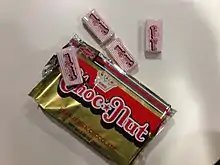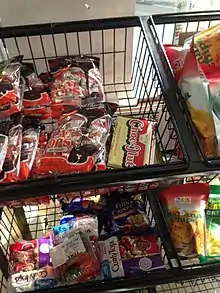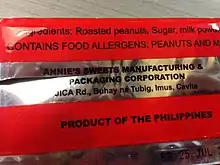Choc Nut
King Choc Nut (or tsoknat) is a chocolate product manufactured by Unisman and later, Annie’s Sweets Manufacturing and Packaging Corporation.[1] It originated in the Philippines and has endured as one of the country’s most consumed children's snacks.[2] While only mass-produced in the Philippines, many ‘Filipino stores’ abroad sell the item. Ingredients of Choc Nut include coconut milk, crushed peanuts and cocoa powder, resulting in a distinct nutty taste and crumbly texture.[1][3]


Manufacturing history
King Choc Nut was originally manufactured by a company called Unisman (New Unity Sweets Manufacturing Corporation) in Malabon. However, the new information on the packaging indicates that the product has now been bought out by Annie’s Sweets, the rival company that produced Hany, a chocolate bar with similar ingredients.[1]

Distribution
Choc Nut was usually available in convenience (sari-sari) stores and could be bought individually. However, some time after the brand was acquired by Annie’s Sweets, Choc Nut began to dwindle in supply, being replaced in most grocery and convenience stores by chocolate bar with similar taste and ingredients called Hany.[1] Today Choc Nut is predominantly found in supermarkets where they can be purchased by the pack. The brand is also imported to overseas retailers such as ‘Filipino stores’ popular in other countries around the world, where they are sold alongside various local products.[3]
Packaging
A pack of Choc Nut contains 24 pieces individually wrapped in silver foil and white paper, later plastic, on the outer side bearing the logo and signature red stripes. The packs are a bronze colour with white and red lines running through it horizontally.
In the early days of its manufacturing, Choc Nut wrappers printed promos or collectibles on the inside of the wrapper. This was eventually discontinued.[3]
Related products
King Choc Nut manufacturers also sell a powdered milk version of the sweet.
Many restaurants and cafes in the Philippines use Choc Nut as a popular ingredient in confections, drinks and even martinis.[1][4]
See also
References
- Loresco, Shadz. "Where's My Choc Nut?". Rappler. Retrieved 7 August 2017.
- Limos, Mario Alvaro (2020-04-26). "A Short History of Chocnut". Esquiremag.ph. Retrieved 2020-04-26.
- Quiogue, Monette. "Going Nuts Over Choc Nut". Philippine Daily Inquirer. Retrieved 7 August 2017.
- Verdolaga, Gina. "Chocnut-Crazy". Pinoy Delikasi. Retrieved 8 August 2017.
